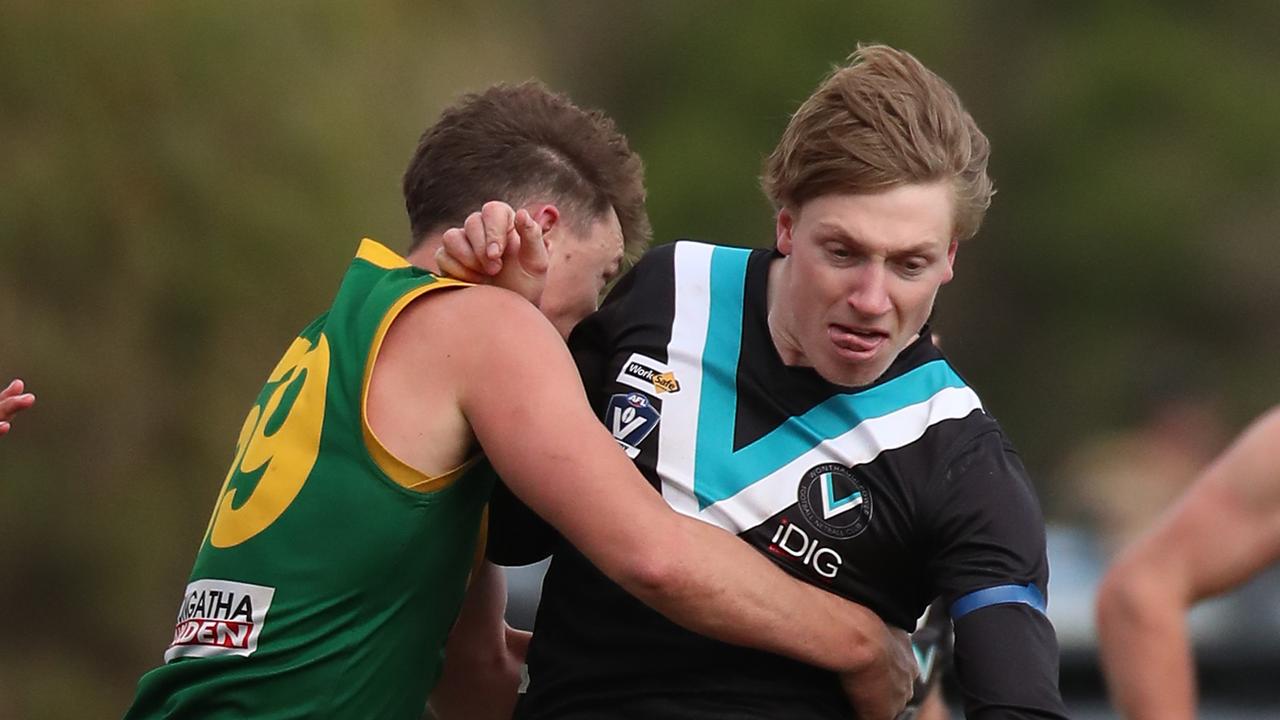Tassie’s team of cricket champions
CRICKET Tasmania and the Sunday Tasmanian are giving you the chance to win a historic print honouring the 150th anniversary of cricket in Tasmania.
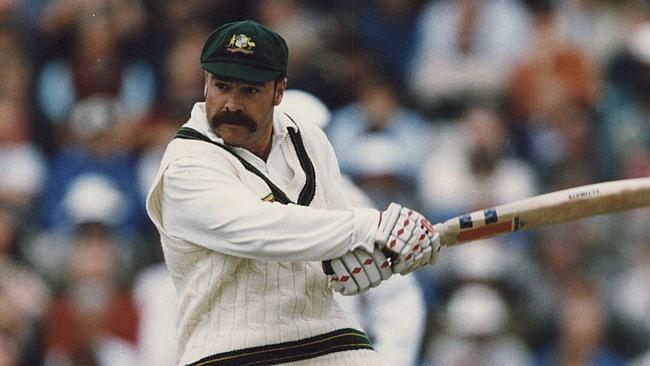
Local sport
Don't miss out on the headlines from Local sport. Followed categories will be added to My News.
CRICKET Tasmania and the Sunday Tasmanian are giving you the chance to win a historic print by renowned sports artist Jamie Cooper honouring the 150th anniversary of cricket in Tasmania.
The Sunday Tasmanian has unveiled a shortlist of 30 players. On February 23, Cricket Tasmania will reveal its team of 12 Tasmanian-born champions selected by its cricket historians as the best team from the first 150 years of Tasmanian cricket. The first person to match the 12 in batting order or the closest to the mark will win the signed print.
THE EARLY YEARS
Kenneth Burn
(1862-1956)
48 first-class matches,
1750 runs @ 21.6, HS 119,
14 wickets @ 22.85, BB 3-15.
The son of the Richmond butcher, Burn was Tasmania’s first Test player and a prolific club and state cricketer. He played two Tests on the 1890 tour of England but failed to make an impact. He was selected as a wicketkeeper for that tour, but it wasn’t until he was on the boat that he admitted he had never kept wickets. However, his impact on Tasmanian cricket was immense, winning the TCA batting averages 11 times, including seven in succession, as well as captaining the state — a position he held for nearly 20 years.
Charles Eady
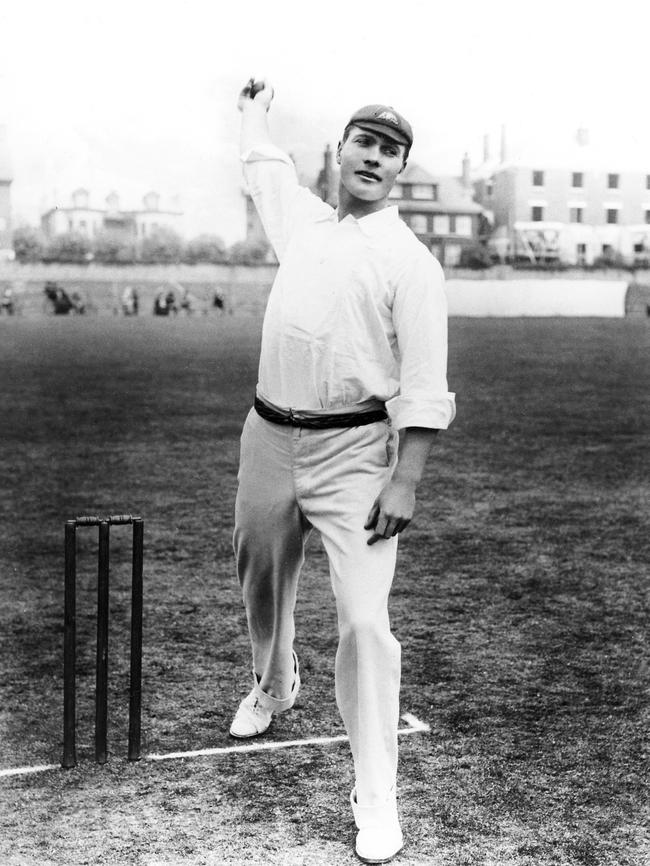
(1870-1945)
43 first-class matches,
1490 runs @22.92, HS 116,
136 wickets @ 23.13, BB 8-34.
Best remembered for scoring 566 in one innings for Break O’Day against Wellington, Eady also played two Tests in 1896 in England, but ill health restricted his appearances on tour. His list of feats is remarkable. Aside from his mammoth 566, he was the first Australian and fourth anywhere to score centuries in each innings of a game when he made 116 and 112 not out against Victoria. In his next first-class game, also against the Vics, he showed his all-round skills taking 8-34 and 4-29.
Reginald Hawson
(1880-1928)
27 first-class matches,
1705 runs at 37.06, HS 199*.
Born in Hobart and educated at Hutchins, Hawson was regarded the state’s best batsman in the decade prior to the Great War. He made his first class debut in 1898-99 and soon became a regular member of the side. His highest score of 199 not out, achieved in 1912-13 remained a state record until 1933-34. Hawson saved his best performances for Victoria, where he chalked up an impressive 1203 runs at 50.91 against them. He was unlucky not have represented Australia, especially in 1912 when six of the country’s leading players refused to tour England.
Douglas Green
(1902-1990)
25 first-class matches,
1265 runs @ 30.11, HS 150*.
Green played a major role in Tasmania’s top order for more than a decade. His solid, grafting style often became the subject of criticism — due to the high price he put on his wicket — and he would often reply with a “you can’t make runs in the grandstand” when questioned about his approach. Working with the Commonwealth Bank meant Green struggled to represent his state as often as he should have, but when he did he ensured he cashed in. His highest score, 150 not out against Victoria in 1932-22, helped Tasmania save the game.
Ron Morrisby
(1915-1995)
51 first-class matches,
2596 runs @ 32.45, HS 145.
A technically correct opener who played all bowling with ease and elegance, Morrisby was Tasmania’s best batsman for two decades either side of World War II. He was handed the captaincy at 23 and from that point until he retired in 1952 he held the position more often than not. Morrisby was a prolific run scorer at grade level, compiling 19,170 runs at 51.5 with 48 centuries in 295 games with South Hobart and 65 for Clarence. After retiring Morrisby spent 25 years on the Association Committee as a selector.
Ted Windsor
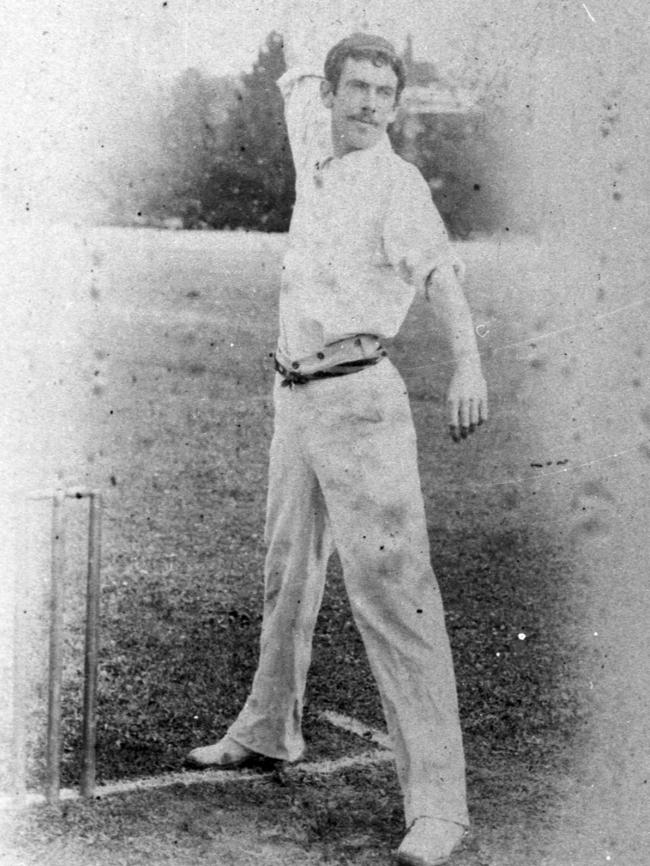
(1869-1953)
26 first-class matches,
1460 runs @ 32.44, HS 90,
129 wickets @ 31.5, BB 6-55.
An off-spinning all-rounder, Ted Windsor held the record for the most first-class wickets for Tasmania for 80 years. He had great control with ball in hand but was also destructive with the bat, earning the nickname “Whack” due to this approach. He took 5-85, 5-113 and scored 75 against various touring English teams and only seemed to get better with age. In 1910, aged 41, he was selected in the Australian team to tour New Zealand but turned down the offer due to his age and the difficulty of getting leave from his bank job.
Norman Dodds
(1876-1919)
16 first-class matches,
610 runs @ 21.78, HS 81,
24 catches, 8 stumpings.
A wicketkeeper-batsman of great skill and bravery, but also a larrikin, Dodds was desperately unlucky not to play Test cricket. In a Test trial game for the Australian tour of England in 1909, Dodds made 80 in just 66 minutes and then astounded selectors and spectators by standing up to the stumps to Tibby Cotter, then the world’s fastest bowler. He didn’t miss a chance and just conceded three byes. However, a night out on the drink, where he got too drunk and smashed some bottles, cost him his place on the tour.
Colin Newton
(1894-1979)
27 first-class matches,
1117 runs @ 25.39, HS 117,
56 wickets @ 39.55, BB 4-36.
An all-rounder in the truest sense of the term, Colin Newton was a handy left-hand bat who could swing and seam the ball with his medium-pacers, then bowling orthodox spin. His first-class career spanned 22 years, and he was a permanent fixture, always contributing with the ball or the bat. He was also a champion tennis player, winning eight Tasmanian championships and often juggling both sports on the same day. On one occasion, he made 48 in a club game, went off and won a singles and doubles tennis tournament, before returning to bowl 17 overs straight with the new ball.
Jack Badcock
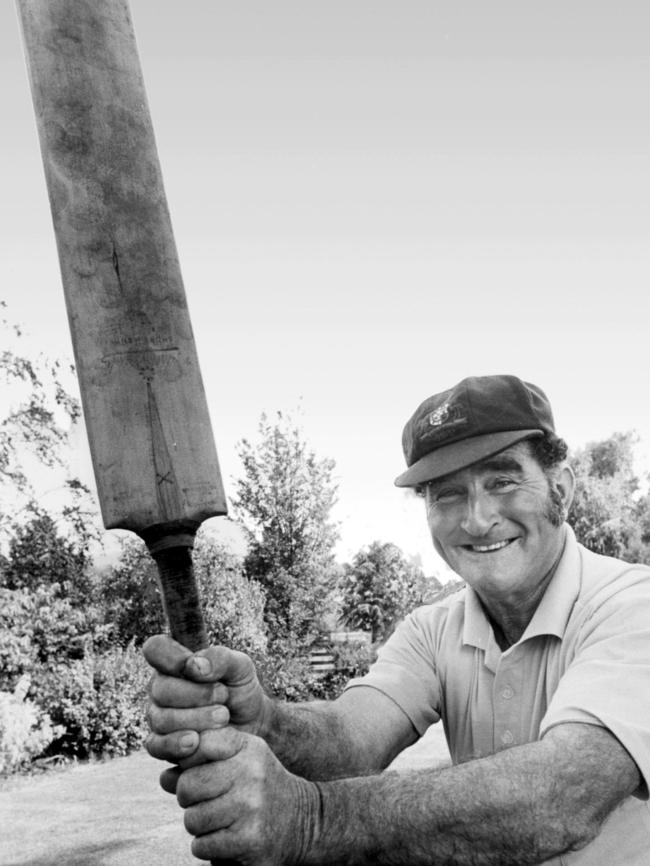
(1914-1982)
97 first-class matches,
7371 runs @ 51.54, HS 325.
A child prodigy, Badcock started playing against men at age 10, averaged 150 at just 13 and played for Tasmania by the age of 16. He still holds the record for the highest first-class score for Tasmania, 274 v NSW, before chasing a Test career in South Australia. Despite dominating for his adopted state, it is one of the great mysteries why his Test career never took off. He made one Test century, but averaged only 14.5 across seven Tests, particularly struggling in English conditions. His first-class career was curtailed by World War II and he returned to Tasmania after serving in the army.
Terence Cowley
(1929-2012)
30 first-class matches,
94 wickets @ 31.5 BB 6/55.
Had Cowley played in another era, he almost certainly would have worn a Baggy Green. A tall, lean, lethal fast-medium bowler who had the ability to move the ball both ways, Cowley is one of the best bowlers to have ever represented Tasmania. He made his first class debut against Victoria in 1948-49, and captained the state for his last four seasons. One of the highlights of Cowley’s career came in 1960-61 against the touring West Indians, where he twice bowled the great Gary Sobers with deliveries which swung towards the slips then whipped back off the pitch.
INTO THE SHEFFIELD SHIELD
Brian Patterson
(1937-)
24 first-class matches,
726 runs @23.41, HS 67*,
51 wickets @39.21, BBI 6-59.
5 List A (50-over) games,
84 runs @16.80, HS 31,
3 wickets @42, BBI 2-27.
Patterson was a determined batsman, an orthodox spinner and an outstanding fieldsman. During the terrible 1960s for Tasmanian cricket the allrounder was one of few bright sparks for the game in the state, and the one Tasmanian player of the period who could walk into any team in Australia. Playing for a Tasmanian XI against the 1960-61 West Indies, he took 3-55 and 6-59 including the scalps of Garry Sobers and Frank Worrell. He was advised to move interstate to further his career — something he declined and regretted.
David Boon
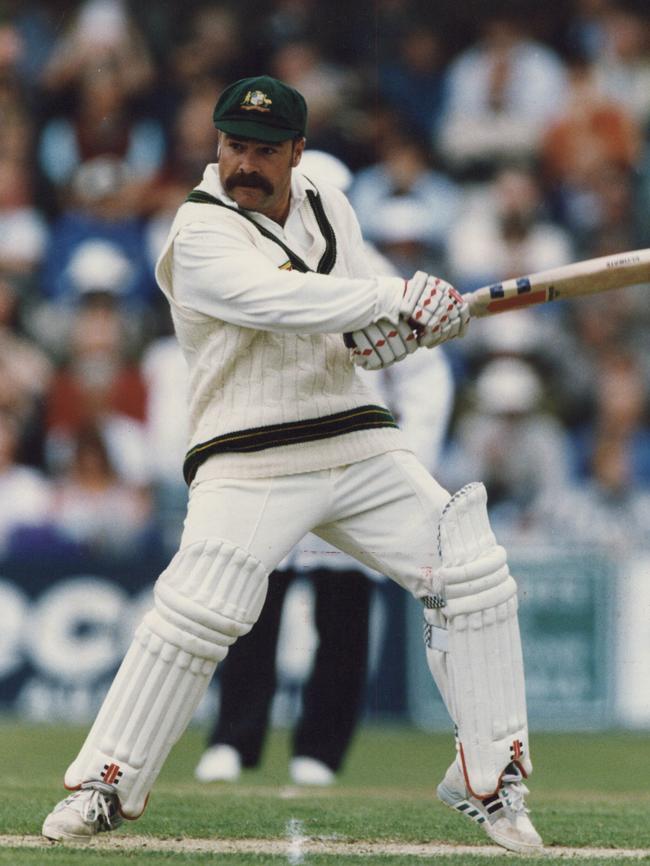
(1960-)
350 first class matches,
23,413 runs @ 44, HS 227.
313 List A (50-over) games,
10,236 runs @ 37.49, HS 172.
Perhaps the state’s all-time favourite cricketing son, Boon was arguably the starting point of truly putting Tasmanian cricket on the map. As an 18-year-old he played a starring role in the history-making Gillette Cup win in 1978-79, kickstarting a career which included four Ashes victories — including the 1989 triumph where he hit the winning runs. Boon’s durability was a vital ingredient in Australia’s resurgence as a cricketing power in the late 1980s and early 1990s and his 8029 runs for the Tigers has him placed third behind Jamie Cox and Michael Di Venuto on the state’s all-time list.
Danny Buckingham
(1964-)
83 first-class matches,
4769 runs @ 37.25, HS 167.
23 List A (50-over) games,
506 runs @ 28.11, HS 61.
What could have been for “Burger” Buckingham? Never a fan of fitness or training, but a man of immense natural ability, Buckingham had the talent to play for Australia. In 1991-92, as Bruce Reid (6-55) decimated Tasmania in Perth, Buckingham scored 110 out of 193. In his final season, ’93-94, Buckingham passed 50 in six of his last nine innings, but was dropped for Tasmania’s first ever Shield final after playing a grade game against coach’s orders.
Dene Hills
(1970-)
112 first-class matches,
7894 runs @40.07, HS 265.
47 List A (50-over) games,
1239 runs @30.97, HS 81.
One of the better players to have never played Test cricket, Hills along with Jamie Cox formed one of Tasmania’s greatest opening partnerships. The left-hander had a watertight defence, but was elegant on his favoured off-side. In the 1997-98 season, he scored back-to-back double centuries, against Victoria (205) and his highest ever first-class score of 265 against South Australia. In a season where Tasmania made the final he was named the Shield Cricketer of the Year with a massive 1220 runs.
Michael Di Venuto
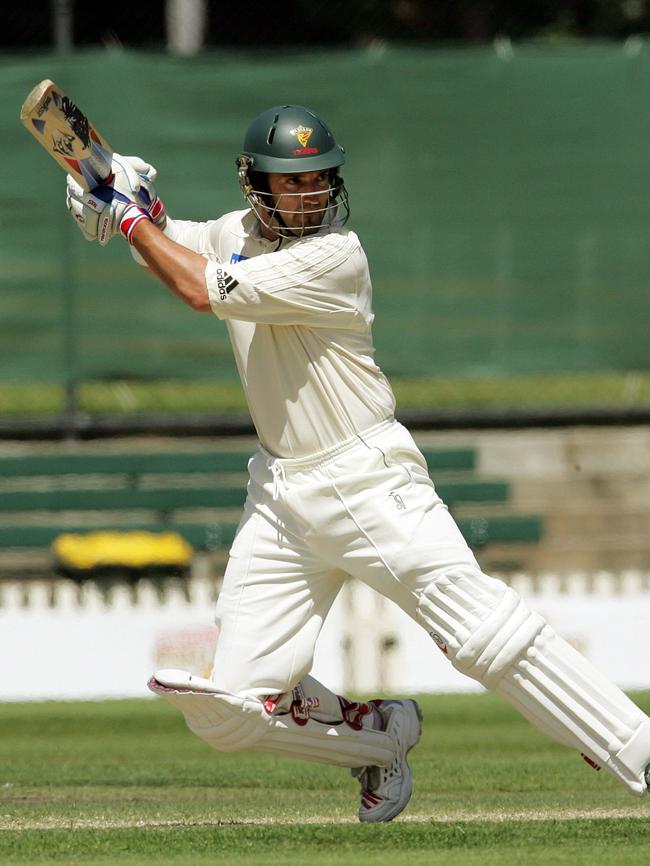
(1973-)
336 first-class matches,
25,200 runs @45.90, HS 254*.
302 List A (50-over) games,
9217 runs @ 33.15, HS 173*.
54 domestic T20 games,
1085 runs @ 23.08, HS 95*.
After making his first-class debut at 19, the left-handed batsman became a mainstay of the Tasmanian top order for over a decade. A backfoot specialist, Di Venuto, now batting coach for Australia, was able to move around the top and middle orders with success. Di Venuto’s efforts for Tasmania were rewarded as he was selected for nine one-day internationals.
Roger Woolley
(1954-)
85 first-class matches,
7481 runs @ 40.17, HS 144.
145 catches, 16 stumpings.
29 List A (50-over) games,
526 runs @ 25.04, HS 80*,
20 catchs, 2 stumpings.
Woolley holds many unique “firsts” for Tasmanian cricket. Predominantly a batsman but also a more than handy gloveman, Woolley was the first Tasmanian-based player to be picked in the national team in 46 years when he made his Test debut in 1983, the first Tasmanian selected for Australia after the state entered the Sheffield Shield, the first Tasmanian to score a Shield century, a member of the state’s first Shield victory (where he scored 99), and a member of the state’s first domestic trophy, the Gillette Cup win.
Stuart Saunders
(1960-)
60 first-class matches,
2114 runs @25.46, HS 138*,
70 wickets @57.37, BBI 5-114.
6 List A (50-over) games,
99 runs @16.50, HS 43,
1 wicket @25, BBI 1-11.
A leg-spinning all-rounder, Saunders was a talented junior who produced some excellent erformances for Tasmania. He was capable of delivering an unplayable ball and this led to early predictions he would represent Australia, but he was not always as accurate as he needed to be and his first-class wickets were expensive. Capable with the bat, possibly his finest moment came against Western Australia in 1981-82 where he scored an unbeaten 106 in a Tasmanian last-wicket record partnership of 120 with Peter Clough.
Jamie Cox
(1969-)
264 first class matches,
18,618 runs @ 42.69, HS 250.
192 List A (50-over) games,
5716 runs @ 31.75, HS 131.
7 T20 matches,
139 runs @ 23.19, HS 53.
Australian cricket’s domestic record games holder (161) and Tasmania’s leading run scorer, there is no doubting had Cox played in another era he would have worn the Baggy Green. Unfortunately he was unable to break into the national setup with the likes of Mark Taylor, Michael Slater, Matthew Elliott, Matthew Hayden and Justin Langer all above him in the pecking order as an opener. The state’s first inductee into the national cricket academy, Cox later become an Australian selector and is now St Kilda’s football boss.
Shaun Young
(1970-)
138 first-class matches,
7212 runs @37.95, HS 237,
274 wickets @ 35.82 BBI 7-64.
102 List A (50-over) games,
2486 runs @32.28, HS 146*,
88 wickets @34.50, BBI 5-39.
An all-rounder with outstanding consistency, Young was always among the best-performing players in Australia in the 1990s-early 2000s. While not the most technically correct player, Young placed a high price on his wicket. His right-arm medium pace bowling also proved to be remarkably effective, with an ability to swing the ball both ways and a tidy line and length. Young can also claim to be an Australian Test player, after winning a Test cap for the sixth Test of the 1997 Ashes series as a late replacement for the injured Jason Gillespie.
Ricky Ponting
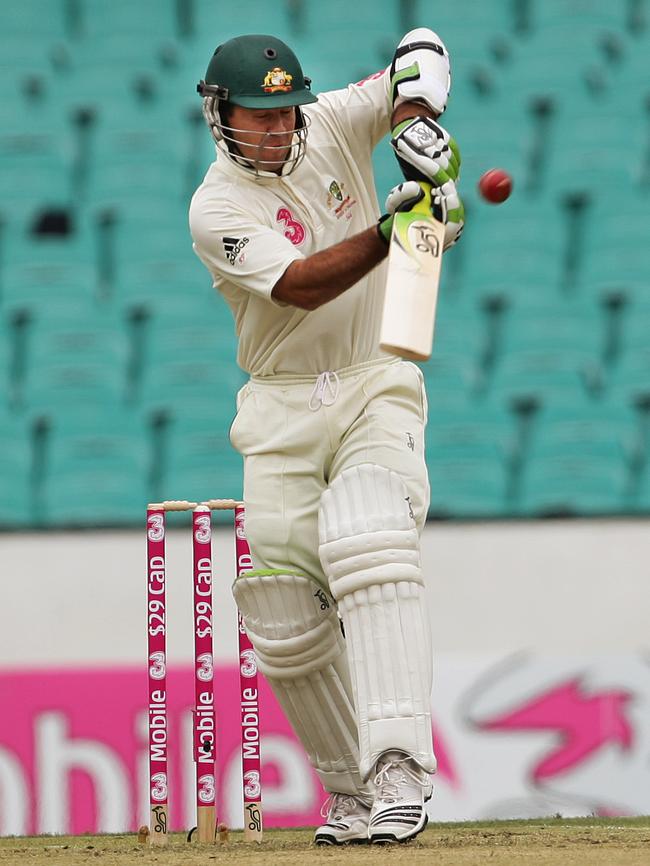
(1974-)
289 first-class matches,
24,150 runs @ 55.90, HS 257.
456 List A (50-over) games,
16,363 runs @ 41.74, HS 164.
48 T20 games,
909 runs @ 22.72, HS 98*.
Undoubtedly the state’s greatest cricketer, almost certainly Tasmania’s best sportsperson and arguably Australia’s greatest batsman behind Bradman. Still Australia’s leading Test and one day run-scorer and only second to Indian batting great Sachin Tendulkar for most Test runs from any nation. He was the first Tasmanian appointed national captain, leading Australia in 77 Tests. There has been no better player of the pull shot in cricket history, but his drives were also sublime. Finished his Tasmanian career in style, lifting the 2012-13 Sheffield Shield after being named the player of the year.
THE GOLDEN ERA
Adam Griffith
(1978-)
50 first class matches,
169 wickets @ 34.3, BB 7-54.
54 List A (50-over) matches,
63 wickets @ 35.0, BB 4-36.
12 T20 matches,
19 wickets @ 15.2, BB 3-14.
One of the state’s most dangerous quicks when fit, Griffith battled a host of injuries throughout his career which not only curtailed his appearances for Tasmania but also cost him a shot at higher honours. Griffith missed two months with a hamstring injury in 2007-08 but was rushed back for the Pura Cup final, highlighting his importance to the side. Armed with a high action, Griffith had the ability to move the ball off the seam in both directions at good pace.
Sean Clingeleffer
(1980-)
74 first class matches,
2708 runs @ 26.5, HS 141*,
220 catches, 12 stumpings.
40 List A (50-over) matches,
362 runs @ 22.6, HS 48,
39 catches, 3 stumpings.
Alongside Luke Butterworth, Clingeleffer was one of the stars of Tasmania’s historic maiden first-class victory in 2006-07. The state’s top wicketkeeper since 2000-01, Clingeleffer was axed during the season following the emergence of Tim Paine before being recalled late in the season. He responded with a brilliant century in the final against NSW, batting for almost the entire fourth day for his 107 to end the Blues chances. He was renowned for his dogged resistance with the bat and quality glovework.
George Bailey
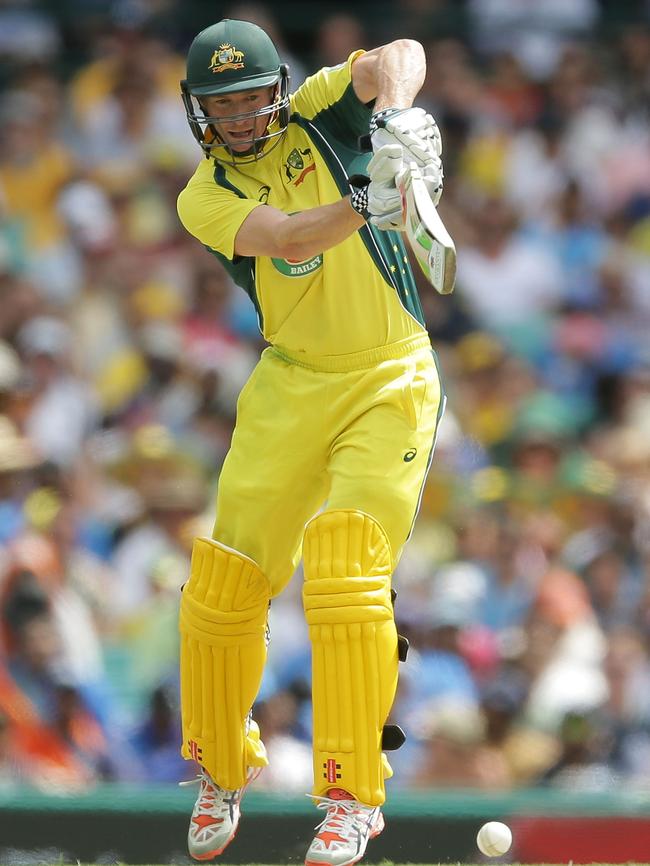
(1982-)
112 first class matches,
7030 runs @38.62, HS 160*.
226 List A (50-over) matches,
6775 runs @36.22, HS 156.
133 T20 matches,
2529 runs @28.73, HS 71.
A key man in Tigers successes, while in recent struggles he has been one of few to still play well. A destructive striker who can change a game in just a few overs, he was at one point ranked the No. 2 ODI batsman in the world. Soon after he made his debut for Tasmania in the 2005/06 season after coming from South Launceston, Bailey was spoken of as a future state leader and national representative. It took just four seasons for the great-great-grandson of 1878 Australia tour member George Herbert Bailey to become Tasmanian captain, leading the side to Sheffield Shield success in 2010/11. Has played for Australia at T20, ODI and Test level.
Brett Geeves
(1982-)
41 first-class matches,
1006 runs @ 21.86, HS 99*,
140 wickets @ 33.10, BB 6-47.
72 List A (50-over) matches,
340 runs @ 13.07, HS 37*,
103 wickets @ 29.20, BB 5-45.
14 T20 matches,
133 runs @ 22.16, HS 28,
19 wickets @ 24.26, BB 4-30.
A feisty right-arm fast bowler, Geeves was a major part of the Tigers golden era. While he missed the first-class trophies, he was an integral member of two Tigers one-day titles, including a man of the match 3-28 against Victoria in the 2007-08 triumph. He was also twice named Ricky Ponting Medallist as the state’s best.
Xavier Doherty
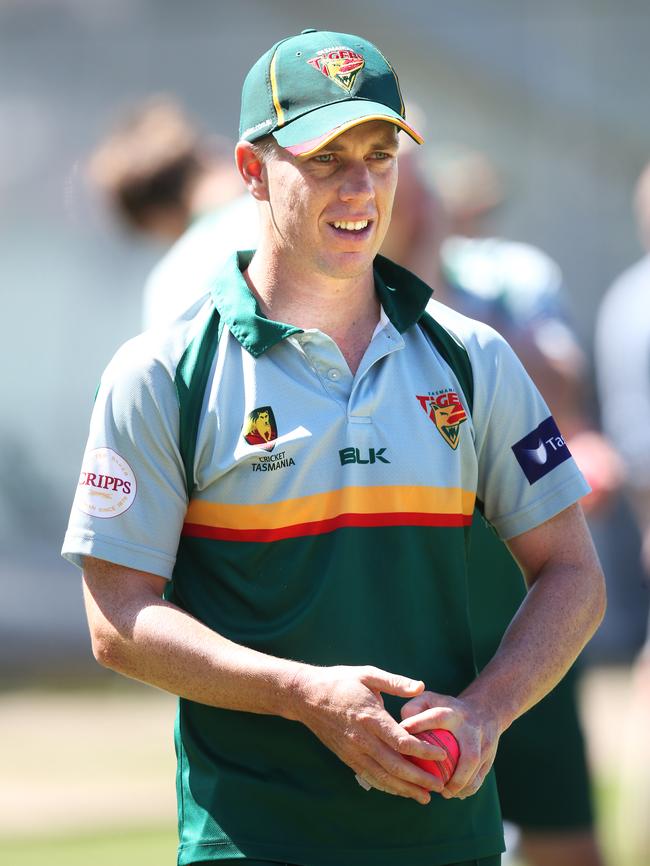
(1982-)
71 first class matches,
1272 runs @ 14.1, HS 53*,
163 wickets @ 42.6, BB 6-149.
171 List A (50-over) matches,
772 runs @ 16.4, HS 53,
186 wickets @ 33.9, BB 4-18.
73 T20 matches,
138 runs @ 17.2, HS 33,
62 wickets @ 31.6, BB 4-17.
For several years Doherty was the premier white ball spinner in the country and a mainstay of Australia’s ODI set-up. A more defensive minded tweaker than wicket-taker, the left-armer has been used in a variety of roles from the opening overs to the death. Was part of last year’s World Cup winning squad but played just one match. Has also played four Tests but struggled to have the impact he does in the shorter forms.
Luke Butterworth
(1983-)
70 first class matches,
2762 runs @27.89, HS 116,
223 wickets @24.68, BB 6-49. 63
List A (50-over) matches,
887 runs @ 22.74, HS 114*,
61 wickets @37.22, BB 3-32.
9 T20 matches,
66 runs @11, HS 36,
5 wickets @38.80, BB 2-27.
A no-fuss, quiet achiever who was a key player in some ofTasmanian cricket’s biggest moments. The all-rounder finished his career as Tasmania’s second highest Sheffield Shield wicket taker but it was his ability to perform in the big games that he was renowned for. His performance in the 2006/07 Sheffield Shield final was matchwinning, making 66 and 106 with the bat and taking 4-33 with the ball in the first innings as he led the Tigers to their first Shield title.
Ben Hilfenhaus
(1983-)
104 first-class matches,
1410 runs @ 12.93, HS 53*,
387 wickets @ 29.34, BB 7-58.
78 List A (50-over) matches,
119 runs @ 9.15, HS 18*,
89 wickets @ 35.55, BB 5-33.
77 T20 matches,
134 runs @ 8.93, HS 38*,
96 wickets @ 21.69, BB 4-27.
Tasmania’s all-time leading first-class and Test wicket-taker, the swing king has been the heart and soul of the Tigers success in modern times. Has played in all three first-class title wins and a one-day trophy. Was named the 2006-07 Bradman Young Cricketer of the Year and while he has made an impact at international level, appears to be destined stuck on 99 Test wickets.
Tim Paine
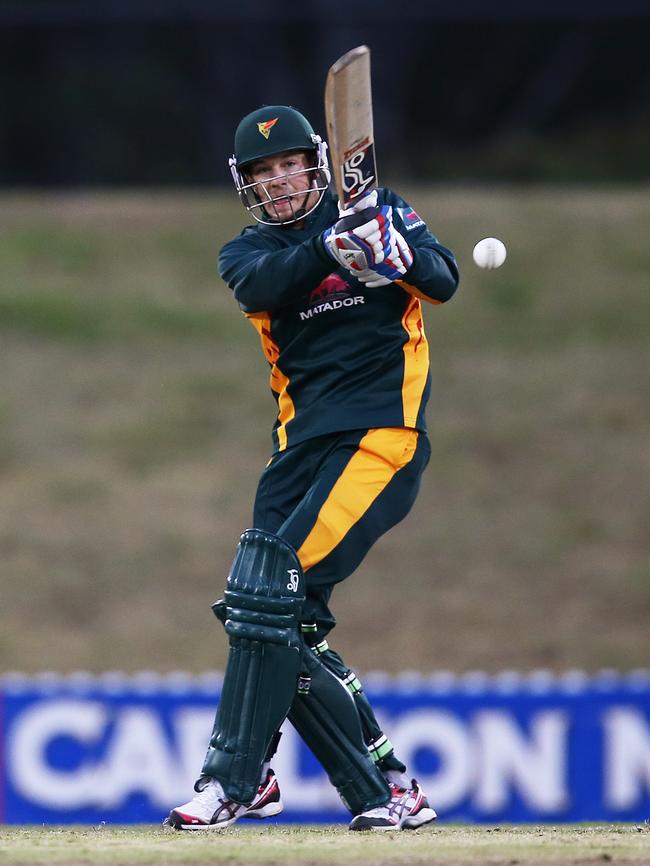
(1984-)
84 first class matches,
3804 runs @ 29.4, HS 215,
229 catches, 11 stumpings.
114 List A (50-over) matches,
3451 runs @ 34.5, HS 134,
149 catches, 18 stumpings.
63 T20 matches,
1341 runs @ 23.9, HS 87*,
39 catches, 12 stumpings.
You can’t help but wonder where Paine’s career would be if not for a broken finger in an exhibition match on the eve of the 2010-11 season. At the time Paine was the country’s No. 2 gloveman behind Brad Haddin, had played four Tests, scored an ODI century and was being touted as a future national skipper. While arguably still the best pure wicketkeeper in Australia, Paine has been unable to find his best form with the bat in the longer version of the game and has fallen down the pecking order.
Alex Doolan
(1985-)
74 first class matches,
4295 runs @33.81, HS 161*.
26 List A (50-over) matches,
713 runs @29.70, HS 96.
13 T20 matches,
149 runs @11.46, HS 30.
An elegant batsman, the son of former Tasmania wicketkeeper and opening batsman Bruce Doolan quickly made the Tigers No. 3 position his own after debuting in 2009. Burst into Test calculations with runs at Sheffield Shield level. He scored 715 runs at 42.05 in the 2012/13 season and in 2014 he received his baggy green against South Africa. Form has waned during the past two Shield campaigns and the battle has been to retain his Tigers spot rather than push to add to his four Test appearances.
James Faulkner
(1990-)
56 first class matches,
2288 runs @ 31.3, HS 121,
180 wickets @ 24.2, BB 5-5.
96 List A (50-over) matches,
1665 runs @ 32.6, HS 116,
133 wickets @ 30.7, BB 4-20.
119 T20 matches,
1158 runs @ 22.7, HS 73,
140 wickets @ 23.3, BB 5-16.
Faulkner played a vital role in Tasmania’s two Sheffield Shield triumphs in 2010-11 and 2012-13. A big game player at any level, the all-rounder was named man of the match in the 2015 ODI World Cup final and has produced his best innings with the bat for his state in both Shield finals. Won three consecutive Ricky Ponting Medals from his breakout season in 2010-11 and while a mainstay in coloured clothing for Australia, has just one Test appearance to his name to date.
THE MERCURY AND CRICKET TASMANIA
150TH ANNIVERSARY CRICKET
COMPETITION
TERMS AND CONDITIONS
By entering the Mercury and Cricket Tasmania’s 150th ANNIVERSARY CRICKET competition, you are agreeing to the following Terms and Conditions:
1. STANDARD TERMS
1.1 Information on how to enter forms part of the Terms and Conditions. Entry into the competition is deemed acceptance of these Terms and Conditions.
2. WHO CAN ENTER
2.1 Subject to clause 2.2, entry is open to all Tasmanian residents.
2.2 Directors, management, employees and their immediate families of the Promoters and their associated agencies and companies are not eligible to enter. Immediate family means any of the following: spouse, ex-spouse, de-facto spouse, child or step-child (whether by natural or by adoption), parent, step-parent, grandparent, step-grandparent, uncle, aunt, niece, nephew, brother, sister, step-brother, step-sister or first cousin.
3. HOW TO ENTER
3.1 The competition commences Sunday, 14 February 2016 at 9.00 am AEST and concludes Tuesday, 23 February 2016, at 12 noon AEST (“the Competition Period”).
3.2 To enter the competition, eligible entrants must enter all details required on the competition page.
3.3 The time of entry will, in each case, be the time that the entry is received by the servers of the Promoter or its appointed agent or contractors for the receipt of entries and not the time of transmission by the entrant.
3.4 The Promoter, its agents, affiliates or representatives will not be liable for any lost, late or misdirected entries.
3.5Incomprehensible, indecipherable or incomplete entries will be deemed invalid.
3.6 If there is a dispute as to the identity of an entrant, the Promoter reserves the right, in its sole discretion, to determine the identity of the entrant.
3.7 Competition entrants assign to the Promoter all right, title and interest in and to all copyright and all moral rights in any material created pursuant to their entry or participation in any aspect of the competition and acknowledge that the Promoter is free to use competition entries and to exercise its rights in relation thereto and entrants will not be entitled to any fee for such use.
4. DRAW
4.1 The winner will be the person who has correctly picked the 12 best Tasmanian cricketers in batting order and correctly matches those chosen by Tasmanian cricket historians, order from the 30 names provided. If no one person matches the 12 best Tasmanian cricketers correctly, the next closest in batting order will be deemed the winner. If there is more than one person who has the correct 12 best Tasmanian cricketers in batting order, the winner will be chosen by random draw from the correct entries. The entries will be judged on Wednesday, 24 February 2016 at 10.00am at the offices of the Promoter at Level 2, 2 Salamanca Square, Hobart TAS 7000.
4.2 The winners will be notified on Thursday, 25 February 2016.
4.3 The Promoter’s decision in relation to any aspects of the competition is final and the Promoter will not enter into any correspondence regarding the result.
4.4 It is a condition of accepting the prize that the winners may be required to sign a legal release in a form determined by the Promoter in its absolute discretion.
4.5 Entries not completed in accordance with these Terms and Conditions will not be considered valid.
4.6 The Promoters reserve the right to request that the winner provide proof of identity, proof of age, proof of residency at the nominated prize delivery address and/or proof of entry validity (including phone bills) in order to claim the prize. Proof of identification, residency and entry considered suitable for verification is at the discretion of the Promoter. In the event that the winner cannot provide suitable proof, the winner will forfeit the prize in whole and no substitute will be offered.
4.7 The Promoters reserves the right to verify the validity of entries and to disqualify any entry which, in the opinion of the Promoter, includes objectionable content, profanity, potentially insulting, inflammatory or defamatory statements, disqualify any entrant who tampers with the entry process including but not limited to tampering by way of use of techniques designed to avoid the payment of SMS costs, who submits an entry that is not in accordance with these Terms and Conditions, or who has, in the opinion of the Promoter, engaged in conduct in entering the competition which is fraudulent, misleading, deceptive or generally damaging to the goodwill or reputation of the competition and/or Promoter. The Promoter reserves the right to disqualify the winner if the Promoter becomes aware that the winner and/or the winner’s entry is of a type described in this clause.
5. PRIZE
There is one prize, it consists of a limited edition 150 Years framed print which is valued at $495. The print is from the painting by Jamie Cooper which celebrates 150 years of Cricket Tasmania
6. NO LIABILITY
6.1 The Promoters shall not be liable for any loss or damage whatsoever which is suffered (including but not limited to indirect or consequential loss) or for any personal injury suffered or sustained in connection with any prize/s except for any liability which cannot be excluded by law. Neither are the Promoters responsible for any incorrect or inaccurate information, either caused by the entrant or for any of the equipment or programming associated with, or utilised in this competition, or for any technical error, or any combination thereof that may occur in the course of the administration of this competition, including any omission, interruption, deletion, defect, delay in operation or transmission, communications line or telephone, mobile or satellite failure, theft or destruction or unauthorised access to, or alteration of, entries, and reserves the right to take any action that may be available.
6.2 If for any reason, this competition is not capable of running as planned, including due to infection by computer virus, bugs, tampering, unauthorised intervention, fraud, technical failures or any other causes beyond the reasonable control of the Promoters, which corrupt or affect the administration, security, fairness, integrity or proper conduct of this promotion, the Promoters reserve the right, in its sole discretion, to disqualify any individual who tampers with the entry process, take any action that may be available and to cancel, terminate, modify or suspend the competition subject to any written directions given under State Legislation.
6.3 Except for any liability that cannot be excluded by law, the Promoters (including it officers, employees and agents) excludes all liability (including negligence) for any personal injury or loss or damage (including loss of opportunity) whether direct, indirect, special or consequential, arising in any way out of the promotion, including but not limited to, where arising out of the following:
a) any technical difficulties or equipment malfunction (whether or not under the Promoter’s control);
b) any theft, unauthorised access or third party interference;
c) any entry or prize claim that is late, lost, altered, damaged or misdirected (whether or not after receipt by the Promoters) due to any reason beyond the reasonable control of the Promoters.
d) any variation in prize value to that stated in these conditions of entry;
e) any tax liability incurred by a winner or entrant;
f) the broadcast of any program relating to the competition or the publication of any material, including statements made by any compere, staff member, journalist, other entrants or any other person; and/or
g) participation in the prize.
6.4Once prizes have left the Promoters’ premises, the Promoters and their associated agencies take no responsibility for prizes damaged, delayed or lost in transit.
6.5 The Promoters reserve the right, in its sole discretion, to disqualify any individual who the Promoters have reason to believe has breached any of these conditions, or engaged in any unlawful or other improper misconduct calculated to jeopardise the fair and proper conduct of the promotion. The Promoters’ legal rights to recover damages or other compensation from such an offender are reserved.
7. PRIVACY CONSENT
7.1 To provide you with this promotion, the Promoters need to collect personal information about you. If you do not provide the information requested, the Promoters may not be able to provide you with the promotion entry.
7.2 Each entrant agrees that subject to the Privacy Act, the Promoters or its agents may do the following:
a) transfer personal information confidentially to the Promoters or other organisations that provide services in relation to this promotion;
b) disclose personal information to State and Territory lottery departments;
c) publish the winners’ names as required under applicable law; and/or
d) use the prize winners’ personal information in any media for publicity purposes associated with the promotion without any further payment or other compensation, unless the prize winner otherwise notifies the Promoters at the time of accepting the prize.
7.3 Entry details remain the property of the Promoters, and their related entities and are collecting the entrant’s personal information for the purpose of conducting and promoting this competition (including but not limited to determining and notifying winners). The entrant may request access to his or her personal information by calling the News Ltd privacy office on 02 9288 3212.
8. PROMOTER’S DETAILS
8.1 The Promoters are: Davies Brothers Pty Limited (ABN 37 009 475 754) of Level 2, 2 Salamanca Square, Hobart TAS 7000 and Cricket Tasmania (ABN 34 009 476 993) of Blundstone Arena, Bellerive, 15 Derwent Street, Bellerive TAS 7018.


